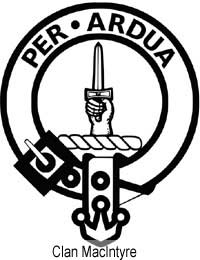Scottish Surnames and Location

When you start looking at Scots surnames, it’s worth remembering that for centuries there was frequent migration between Scotland and Ireland, so it’s not uncommon to find many similar surnames in both countries. Although a few Scottish surnames are very old, the majority weren’t in common use until the 14th century, much the same as in England.
The first surnames belonged to the great landowners, who were directed by the king to adopt surnames, and named themselves after their lands, the first location surnames, if you will.
However, there are other factors in play in Scotland, with some surnames associated with the Highlands and others with the Lowlands, as well as some with clan affiliation.
Clans
There are clans like the MacDonalds and a number of others (originally, as in Ireland, the Mac would have meant “son of” Donald). It’s also been said that those who joined a clan always adopted the clan’s name as their last name as a sign of their loyalty. This is correct, but only up to a point. It showed their loyalty and brought them under the protection of the clan. But if they moved to another area, where another clan ruled, they’d change their surname to that of the new clan, so surnames were malleable, not fixed. The practice was prevalent in the Highlands and around the border with England, but not really in the Lowlands.There are surnames that are not clan names, but which are associated with different clans. For example, Adie, Addison, Aitcheson and Aitken are all associated with the Gordon clan. The only way to know the connection is to research the name involved.
Location Names
It wasn’t just the great landowners who took their surnames from places. So did many residents of the places. So a name such as Calder (or Caddell) would mean someone from the West Lothian area of Calder. However, it could also mean someone from Calder in Lanarkshire, or other Calders in Caithness or Nairnshire. Where there are a number of places that share the same name, establishing the origin of people with that surname can be problematic.Patronyms
The patronymic style, where a man who James, son of John, would called himself James Johnson, while his son would take Jameson as his last name, was in common currency in Lowland Scotland until the 15th century. After that, though, the surname became fixed rather than changing with each generation.In the Highlands, where Gaelic remained the predominant language, Mac as “son of” remained in use much longer. However, in Scotland it had a somewhat wider range than in Ireland. MacIntyre, for instance, originally meant son of a joiner, and the same process was applied to other professions. At times an extra generation was added for increased differentiation by adding Vic after the Mac surname.


Re: Using Criminal Records For Family History Research
Trying to find dads past history with arrests just out of interest as hes recently passed away and…
Re: Using Criminal Records For Family History Research
Hi all i wanted to find out about my dad's past and nobody seems to know much about it or what he did.…
Re: Maiden Names in Genealogy
Looking for my fathers mother maiden name
Re: Genealogy and a Criminal Past
I am trying to find out about my father crime in 1992 or 1993 my father as pass away 1998 and I would like to find out why he got…
Re: Using Criminal Records For Family History Research
I am trying to find my biological father's police criminal record as I was abused as a child but have…
Re: Cremation Records and Tracing Your Family History
I am trying to find out where has my friends aunt Adelinda Diaz McMullen was cremated and who was her…
Re: Cremation Records and Tracing Your Family History
CAN SOMEONE PLEASE HELP ME WITH TRYING TO FIND OUT WHERE MY FATHER WAS CREMATED/BURIED IN KENT UK. I…
Re: What If You Have Asian Roots?
Ancestor Edward Albert Wells was born in Trichinopoly on 8 May 1833 to his father George Wells of the 54th Regiment at Foot and…
Re: How to Use Church Marriage Records to Trace Your Ancestors
It is still legal for first cousins to marry.
Re: Cremation Records and Tracing Your Family History
My sister finance was cremation and she stayed up by his bedside at Augusta university for days on out…